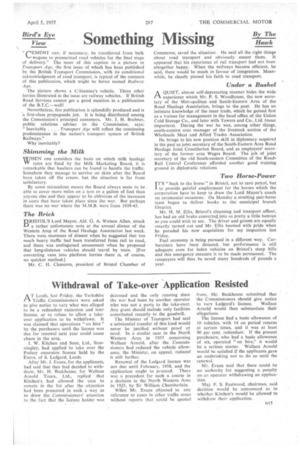Bird's Eye View
Page 55

If you've noticed an error in this article please click here to report it so we can fix it.
Something Missing
"
By The Hawk
CEMENT can, if necessary, be transferred from bulk wagons to pressurized road vehicles for the final stage of delivery." The tenor of this caption to a picture in Transport Age, the first issue of which has been published by the British Transport Commission, with its conditional acknowledgment of road transport, is typical of the contents of this publication, which might be better named Railway Age.
The picture shows a C-licensee's vehicle. Three other lorries illustrated in the issue are railway vehicles. If British Road Services cannot get a good mention in a publication of the B.T.C.—well!
Nevertheless, this publication is splendidly produced and is a first-class propaganda job. It is being distributed among the Commission's principal customers. Mr. J. H. Brebner, public relations adviser to the Commission, says: "Inevitably . . . Transport Age will reflect the continuing predominance in the nation's transport system of British Railways."
Why inevitably7
Skimming the Milk
Vi' one considers the basis on which milk haulage rates are fixed by the Milk Marketing Board, it is remarkable that hauliers can be found to handle the traffic. Somehow they manage to survive on skim after the Board have taken off the cream, but the situation is far from satisfactory.
By some miraculous means the Board always seem to be able to cover more miles on a tyre or a gallon of fuel than anyone else and they appear to be oblivious of the increases in costs that have taken place since the war. But perhaps there was no war where the M.M.B. were from 1939-45.
The Brick
BRISTOLS Lord Mayor, Aid. G. A. Watson Allan, struck a rather unfortunate note at the annual dinner of the Western Area of the Road Haulage Association last week. There were murmurs of dissent when he suggested that too much heavy traffic had been transferred from rail to road, and there was undisguised amusement when he proposed that long-distance vehicles should travel by train. [For converting vans into platform lorries there is, of course, no quicker method.]
Mr. C. H. Clements, president of Bristol Chamber of Commerce, saved the situation. He said all the right things about road transport and obviously meant them. It appeared that his experience of rail transport had not been altogether happy. When the railways became efficient, he said, there would be much in favour of integration. Meanwhile, he clearly pinned his faith to road transport.
Under a Bushel
AQUIET, almost self-deprecating manner hides the wide experience which Mr. P. S. Woodhouse, the new secretary of the Metropolitan and South-Eastern Area of the Road Haulage Association, brings to the post. He has an intimate knowledge of the meat trade, which he gained first as a trainee for management in the head office of the Union Cold Storage Co., and later with Towers and Co., Ltd. (meat importers). During the war he was, among other things, south-eastern area manager of the livestock section of the Wholesale Meat and Allied Trades Association.
He brings to his new position skill in diplomacy acquired in the past as joint secretary of the South-Eastern Area Road Haulage Joint Conciliation Board, and as employers' secretary of the former area Wages Board. The job of joint secretary of the old South-eastern Committee of the Road. Rail Central Conference afforded another good training ground in diplomatic relations
Two Horse-Power
IT'S "back to the horse" in Bristol, not to save petrol, but to provide gainful employment for the horses which the corporation have to keep to draw the Lord Mayor's coach on ceremonial occasions. On Monday a strutting pair-horse team began to deliver books to the municipal branch libraries.
Mr. H. M. Ellis, Bristol's cleansing and transport officer, has had an old brake converted into as pretty a little boxvan as you could wish to see. The driver and groom are equally smartly turned out and Mr. Ellis beamed with pride when he paraded his new acquisition for my inspection last Friday.
Fuel economy is being pursued in a different way. Carburetters have been detuned, but performance is still adequate even for laden vehicles on Bristol's steep hills and this emergency measure is to be made permanent. The ratepayers will thus be saved many hundreds of pounds a year.
















































































































